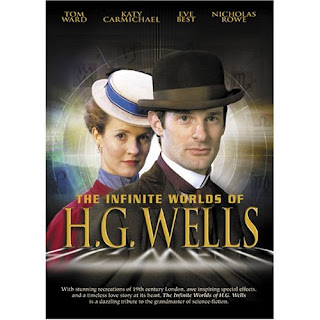
After a while of figuring out what my next review should be, I finally chose something I’d seen recently at random. I’ll have to do this more often, it’s a nice motivator. Anyway, THE INFINITE WORLDS OF H. G. WELLS is not properly a movie, but a miniseries produced by Hallmark, but these sorts of things make less difference when you can watch the whole shebang on DVD, so I’m again classing it both ways. I don’t have a good dedicated television category yet.
I initially balked at THE INFINITE WORLDS OF H. G. WELLS due to its length; it’s listed as running at a solid four hours, and I wasn’t sure the premise could hold my interest for that long. I’m a fan of Victorian science fiction, but it took me a while to really invest in watching the whole thing, even with breaking it up into segments. (Something I rarely do for DVDs.) But I warmed to this as time went on, because as basic a concept as it is- inserting the author himself into fantastic scenarios based on his stories- the filmmakers emphasize the human element, giving us a series of vignettes that turns into a very sweet and charming story. It’s still too long, mind you, but not by much.
The framing device of the series is that a reporter (Ellen McGillvray) visits Wells (Tom Ward) in 1946 (shortly before his death) to ask him about a series of incidents from his past- incidents that he ended up writing as stories. She’s got an agenda of her own, but Wells is happy to share, and so we go back to VIctorian times, when he was just a struggling writer with a friend or two at the local university science department, and an eye for Jane Robins (Katy Carmichael), a beautiful researcher with a curiosity that rivals his. Wells comes across a man who moves so quickly he’s seen as invisible, another who gets shot back in time a week and tries to take advantage of his foreknowledge, a meteor that carries images of another world, and other oddities. Wells and Robins grow closer as he investigates, and in the present tense we learn more about the reporter’s real mission.
I confess to not having read the short stories on which this series is based (I’m more familiar with Wells’ novels), but not only do they echo some of the ideas Wells would play with in his longer work, but they’re an interesting snapshot of early science fiction; Well’s big contribution to the genre, apart from being very good at writing in general, was in setting down many concepts we now find familiar. There’s an appealing simplicity to most of the stories presented here, and that frees up the series to focus more on the people involved than on explaining what’s taking place. The story of the man projected back in time becomes a charming narrative about the mostly working class inhabitants of a local pub, and a weirdly O. Henry-esque story about an overly literal potions shop turns into a wonderful romance about weight, class, and mathematics. You’ve got a core of recurring characters at the university, but also a lot of guest turns- it’s almost like an ongoing television series, and you wish it could have been, but by nature the source material is finite.
The casting is especially good; Tom Ward is charming but just standoffish enough to pull off Wells’ intellectualism, and Carmichael is, well, breathtaking. She’s extremely attractive, very sharp, and never less than convincing as an exceptional woman in an age that looked down on such things. The central romance is very sweet, and gently handled; the two take on a Nick and Nora Charles quality as the series unfolds. Nicholas Rowe is also memorable as Professor Gibberne, Wells’ perpetually frazzled friend at the university who goes through lab assistants at an alarming rate.
The series is broken up into three parts, each under 90 minutes and containing two stories plus surrounding material. Because this, like all television, is held to a time limit, and since in this case it’s more a question of filling space rather than fitting into it, the series does feel padded at times. Scenes go on for slightly longer than they should, and sometimes material just seems to be tacked on. The restraints of the series’ budget also show at times, though I didn’t spot any major problems with the period detail. Then again, I probably wouldn’t notice a zeppelin in a Revolutionary War movie.
Overall this is a very pleasant little series, not quite something you’d want to watch all in one go but very enjoyable spaced out over time. At heart, it’s a tribute to Wells and his visionary status, which remains remarkable to this day; the man predicted so many things that he created unfair expectations for every other science fiction writer, most of whom are not in the prediction game to start with. The project is animated by a sincere love for the author and his work, and that gentle good nature permeates everything. I actually watched it a while ago, but apparently it lingers in the memory long enough for me to still want to recommend it to you. That’s a good sign.
Based on the short stories of H. G. Wells (naturally)
Story and Format by Nick Willing
Teleplays by Chris Harrald, Clive Exton, Matthew Faulk, and Mark Skeet
DIrected by Robert Young
Grade: B+
No comments:
Post a Comment